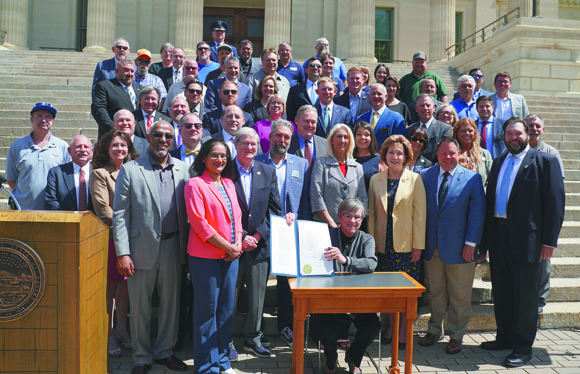ELLY GRIMM
• Leader & Times
Workers compensation has been a hot topic and recently, the State of Kansas took some action to help with just that.
Last Wednesday, Gov. Laura Kelly ceremonially signed Senate Bill 430, bipartisan legislation making comprehensive reforms to the state’s workers compensation system. Gov.Kelly was joined by the Kansas Department of Labor (KDOL), the Kansas National Guard, key negotiators, business groups, and labor organizations from across Kansas to celebrate the improvements.
“Senate Bill 430 is a win for our workforce, our businesses, and organized labor,” Gov. Kelly noted in a release from the State of Kansas. “The changes to the Kansas Workers Compensation Act will keep employers’ costs down while ensuring injured workers receive treatment in a timely manner.”
Senate Bill 430 provides coverage for members of the Kansas National Guard and streamlines the workers compensation process. The legislation also increases the maximum benefits for injured workers and adds a cost-of-living adjustment to those caps starting in 2027.
Some key components of the compromise, which will go into effect July 1, include:
• A reduction in the Social Security offset,
• A limit on the use of independent medical exams,
• A requirement for parties to exchange medical records prior to a preliminary hearing,
• Introduction of medical reports without taking depositions, and
• The ability to settle by written agreement rather than through a hearing.
Gov. Kelly had officially signed the bill back in April.
“This legislation is a win for our workforce, our businesses, and organized labor,” Gov. Kelly noted in an April State of Kansas release. “The reforms in this legislation will create a more just and efficient workers compensation system that increases the benefits for injured workers while creating administrative efficiencies and maintaining stability for businesses. The legislation increases the maximum benefits for injured workers and adds a cost-of-living adjustment to those benefits beginning in July 2027, and also provides workers compensation coverage for members of the Kansas National Guard and significantly reduces the Social Security retirement offset for certain disability benefits.”
Other state leaders also praised the bill.
“The bill’s language is the result of countless hours of effort by representatives of injured workers, industry, and the State to craft much-needed and meaningful updates to the Kansas Workers Compensation Act,” Anton C. Andersen, Defense Attorney and Director for the Kansas Self Insurer’s Association, noted in the State of Kansas release. “Those negotiations resulted in SB 430 preserving the equitable changes adopted in 2011 while at the same time addressing some of the most pressing issues facing injured workers and employers in workers compensation matters. SB 430 will return stability to Kansas' workers compensation system as well as improve the processes and procedures by which benefits are awarded and paid.”
“The 2024 amendments to the Kansas Workers Compensation Act provide substantial help for Kansans who are injured at work,” Jan Fisher, attorney at McCullough Wareheim & LaBunker, P.A., noted in the State of Kansas release. “The most important aspect of the new law is the long-overdue increase in compensation maximums for both temporary and permanent disability payments. In addition, the reduction to 50 percent for the social security offset is beneficial to working seniors who are injured on the job. The Kansas AFL-CIO and the Kansas Trial Lawyers Association thank Governor Kelly and the Kansas Legislature for their support of these reforms. This compromise was a collaboration between business and labor. Both sides were committed to safeguarding a workplace culture that prioritizes the well-being of employees while maintaining business efficiency and growth.”
"This legislation is a significant step in achieving a balance between the needs of workers and the realities of the business world,” Kansas Department of Labor Secretary Amber Shultz noted in the State of Kansas release. “We are proud to play a part in the creation of a more fair and equitable system.”








